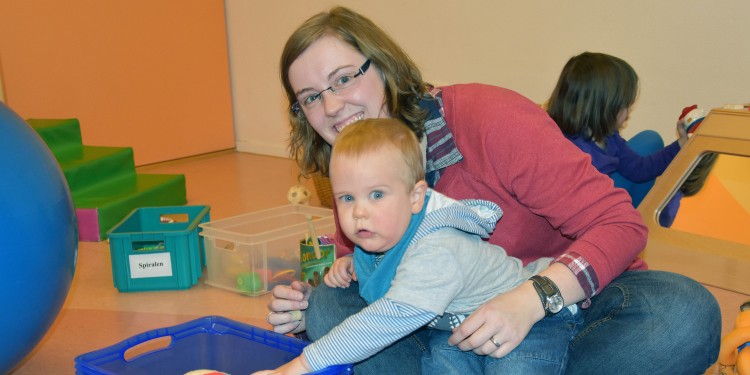
Between going to lectures and changing nappies
Full of beans, little Jan runs around the toy-filled room in the Haus der Familie. While the 18-month-old toddler is having his fun, his mother, Anna Gerding, chats with other like-minded parents in the Studi-Kidz Café. Twice every semester, the Gender Equality Officer representing the student body, the Welfare Advice Centre and the Students’ Organisation AStA organize meetings for students with children.
For Anna, 29, and her husband, having a child and studying is no contradiction. "It was a conscious decision of ours to start a family while we were still students", she says. "It means we can be freer and more flexible in organiing the time we spend with our son." Anna is studying English and French, training to be a teacher, and is currently engaged on writing her master’s thesis. "During exam times it’s a lot of work to get everything organized", she adds. "For lecturers it’s a bit unusual for a student to ask for an extension of a deadline because she has a child."
Five percent of students in Germany have a child
A look at the statistics reveals that in Germany five percent of students have one or more children, as shown in the 20th social survey of the German Student Services Organisation carried out in 2012. Half of them are married. In comparison with their fellow-students who do not have children, they are 31 years old on average, making them 7.6 years older. There are no reliable figures for the Münster University, as such details are not noted when students enrol.
The greatest challenges for parents in their everyday life at university is firstly getting their studies organized, and secondly having enough money to live on. "Students who have a child have other time resources than those without the responsibility for a family", says Astrid Schäfer, Head of Advisory Services and the Family-Friendly Studies Office at the German Student Services Organisation. "It affects not only when they can attend lectures or classes, but also how much time they have for learning." Many parents have an additional job to cover their living costs and finance their studies. According to the social survey mentioned above, this affects 59 percent of students with children. Important forms of support for student families are not only advisory services and childcare facilities, but also discounts, subsidies and special accommodation. "Students often have to get by at university without any network of support from their own families", Schäfer explains. "This means that there’s no, or only very limited, help from grandparents." For this reason there is a broad spectrum of services on offer at University of Münster. These range from the advice provided by the Family Services Office and childcare facilities to help with questions of finances, the Studi-Kidz Café and nursing and nappy-changing rooms in many of the University’s institutions.
"One important issue remains: the development of a family-friendly culture at universities"
Where Astrid Schäfer sees room for improvement is in the expansion of flexible childcare services, as well as in qualified advice for students with children and in setting up part-time studies. "One important issue remains: the development of a family-friendly culture at universities", she says. “The aim mustn’t be for example to 'organize children of students away'. It would be better to see starting a family as a real option for students when they’re planning their lives.” The University of Münster has already received the "family-friendly university" Seal of Quality three times, and was given an award for its family-friendly policies by "berufundfamilie Service", an initiative started by the non-profit-making Hertie Foundation.
Anna Gerding aims to begin her practical teacher training in November. Before then, she and her husband need to have found a place for son Jan in a childcare facility so that she can successfully complete the next stage of her training. Gerding is not afraid of the imminent changes, though. "Up to now it’s always worked out all right somehow …", she says.
Translated from German by Ken Ashton
